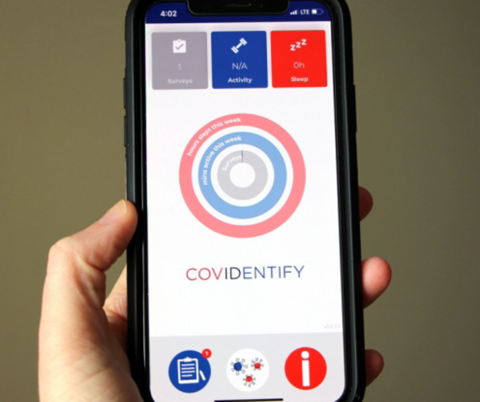Refining and Expanding Duke's Wearable Infection Detection Platform (2023-2024)
Background
The COVID-19 pandemic highlighted the important role wearable devices can play in detecting illness early. Changes in physiologic and behavioral parameters have been measured by wearables during the course of infection. Anomalies in resting heart rate, heart rate variability, blood oxygen saturation, sleep patterns and physical activity have been shown to provide a time-series signature of infection in symptomatic as well as asymptomatic phases. As a result, such wearable “digital biomarkers” can be used to help predict, detect and monitor disease.
To ensure that new infections and clusters are identified before they promote viral spread, it is important to develop case-finding tools that help target diagnostic testing of individuals suspected to be infected. One such tool is Duke’s own CovIdentify, a platform that integrates information from participants’ wearables with simple daily electronic self-reports on symptoms and social distancing. However, implementing existing digital biomarkers and creating new platforms to validate such analysis extends beyond COVID-19 and into the wider medical field.
Project Description
Building on the work of previous teams, this project team will develop a reliable data pipeline that aggregates wearable sensor data from multiple sources. To do so, the team will create a robust and easy-to-use visualization tool that allows access to real-time wearable device data based on login credentials with selected wearable device access for users. The existing iOS application and online infection detection platform dashboard will be refined using user interface and user experience (UI/UX) best practices.
The team will develop and deploy a cloud-based health anomaly detection algorithm that uses wearable data to alert enrolled users of unexpected physiological changes over time that are indicative of illness. The algorithm will be designed to use retrospective electronic health record and wearable data to differentiate between COVID-19, influenza and other disease types. The team will also design and build a custom wearable device for prospective clinical infection detection applications at Duke.
Anticipated Outputs
Data visualizations on mobile and online platforms; infection detection algorithm that alerts users in real time; wearable device used to collect data for future studies; at least one publication
Student Opportunities
Ideally, this project team will include 2 graduate students and 4 undergraduate students with interests in computer science, engineering, product design, data science, public health, UI/UX and communications. An eagerness to learn how to use technology and data to improve people’s access to healthcare is critical.
Undergraduate students will have the opportunity to develop skills in the literature review process, data science, UI/UX, wearable device development and data visualization. They will also practice communication skills by presenting during lab meetings and conveying their ideas in a succinct, clear manner. Graduate students will have the opportunity to further research the development of digital biomarkers from this project if they choose. It is expected that all students contributing to the project will participate in writing at least one publication from this project.
Ali Roghanizad will serve as project manager.
See the related Data+ project for Summer 2023; there is a separate application process for students who are interested in this optional component.
Timing
Summer 2023 – Spring 2024
- Summer 2023 (optional): Conduct literature review; test machine learning algorithm; engage in data/cloud engineering
- Fall 2023: Conduct further literature review; storyboard and implement UI/UX; develop software; design device; engage in data/cloud engineering
- Spring 2024: Develop software; implement and test UI/UX; troubleshoot; test device; draft manuscript for publication
Crediting
Academic credit available for fall and spring semesters; summer funding available
This Team in the News
Meet the Members of the 2023-2024 Student Advisory Council
See related Data+ project, Refining and Expanding Duke's Wearable Infection Detection Platform (2023), and earlier related team, Improving Infection Detection With Wearable Device Data (2022-2023).
Image: CovIdentify app, courtesy of Pratt School of Engineering

Team Leaders
- Jessilyn Dunn, Pratt School of Engineering-Biomedical Engineering
- Ali Roghanizad, Pratt School of Engineering-Biomedical Engineering
/graduate Team Members
-
Dina Habboosh, Electrical/Computer Engg-MS
-
Lauren Lederer, Biomedical Engineering-MS
/undergraduate Team Members
-
Benjamin Asomani, Computer Science (BS)
-
Krish Bansal
-
Ritvik Janamsetty, Electrical & Computer Egr(BSE)
-
Carola Maglione Silva, Computer Science (BS)
-
Luke Redmore, Electrical & Computer Egr(BSE)
-
Minghao Zhang
